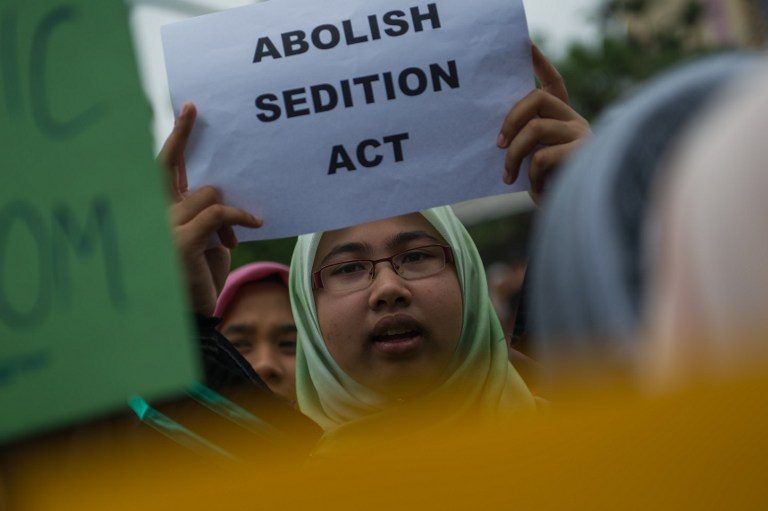SUMMARY
This is AI generated summarization, which may have errors. For context, always refer to the full article.

UNITED NATIONS – It is high time for Malaysia to repeal a law that sends people to jail for crimes as vague as expressing “any seditious words.”
Independent human rights experts working with the United Nations added their voice to the growing call from the international community for Malaysia to stop cracking down on critics using what activists call the draconian and outdated 1948 Sedition Act.
The UN experts urged the government of Prime Minister Najib Razak to make good on its commitment to the UN Human Rights Council to stop criminalizing and prosecuting the right to free expression.
“The Sedition Act is reportedly used in a way that prevents Malaysians from expressing and debating, freely and openly, a diverse range of political opinions and ideas,” the experts said in a statement from Geneva on Wednesday, October 8.
“It is time for Malaysia to adjust its legislation, including the 1948 Sedition Act, to be in line with international human rights standards, and take firm steps towards the effective enjoyment of the right to freedom of expression,” they added.
The experts were the following:
- Special Rapporteur on Freedom of Expression David Kaye
- Special Rapporteur on the Rights to Freedom of Peaceful Assembly and of Association Maina Kiai
- Special Rapporteur on the Situation of Human Rights Defenders Michel Frost
- Special Rapporteur on the Independence of Judges and Lawyers Gabriela Knaul
Malaysia’s civil society and international human rights groups have criticized the British colonial-era law.
The law carries a prison sentence of up to 5 years for vague offenses like expressing “any seditious words,” acting with “seditious tendency” that incite hatred or disaffection of the government or the judiciary, and promoting hostility between different races or classes.
The experts from the UN Human Rights Council said they received reports of at least 23 recent sedition cases, including those filed against members of parliament, politicians, human rights defenders, academics, lawyers, journalists and students for publishing or spreading information through traditional media or the Internet.
Malaysian opposition leader Anwar Ibrahim became the highest profile figure to be investigated for sedition last September over a speech he delivered at a political rally 3 years ago. His lawyers and human rights groups called his case “clearly political and smacks of persecution.”
This is not the first time the UN expressed concern about the sedition law. As early as 16 years ago, the first UN Special Rapporteur on Freedom of Expression Abid Hussain visited Malaysia, and said the law could be used to suppress expression and curb peaceful assembly.
In March, Malaysia promised the UN Human Rights Council that it will address international concerns about the law.
‘Serious threat to democracy’
Najib has yet to fulfill another 2012 commitment to repeal the Sedition Act. Back then, he said the law represented a “bygone era.”
Yet his ruling United Malays National Organization (UMNO) party is widely viewed as having stepped up its use of the law since a historic loss in the popular vote in the 2013 elections.
In an editorial on Tuesday, the New York Times branded the Sedition Act as “deplorable.”
It cited the case of a senior opposition politician who was charged with sedition for criticizing a decision of the appeals court. Another local state assemblyman was charged for reportedly saying, “Damn, damn UMNO.”
“The elections seem to have shaken the government enough for it to arrest and prosecute an array of politicians, journalists, academics, students, religious leaders and civil society activists who did not advocate the overthrow of the government,” the Times said.
“Mr. Najib’s crackdown is a deplorable attack on free speech and a serious threat to democracy. He appeared to understand this danger when he promised to repeal the Sedition Act. He should do so immediately.”
The editorial follows similar statements from the London-based Amnesty International and the New York-based Human Rights Watch.
“The Sedition Act is an outdated and repressive piece of legislation that the authorities are using to target anyone who speaks out against those in power. It must be repealed immediately,” said Rupert Abbott, Amnesty International’s Deputy Asia-Pacific Director in a statement in September.
Human Rights Watch Deputy Asia Director Phil Robertson had a similar message. “Prime Minister Najib should realize that throwing activists and opposition leaders in jail for what they say is a slippery slope to authoritarian rule.”
In Kuala Lumpur, a group of lawyers from the Malaysian Bar Council is planning to protest the law through a peaceful walk to be held on October 16.
The group said it is calling for “a better Malaysia premised on peace, harmony, unity, understanding and freedom from fear, intimidation, exploitation, oppression and extremism.” – Rappler.com
Rappler multimedia reporter Ayee Macaraig is a 2014 fellow of the Dag Hammarskjöld Fund for Journalists. She is in New York to cover the UN General Assembly, foreign policy, diplomacy, and world events.
Add a comment
How does this make you feel?
There are no comments yet. Add your comment to start the conversation.